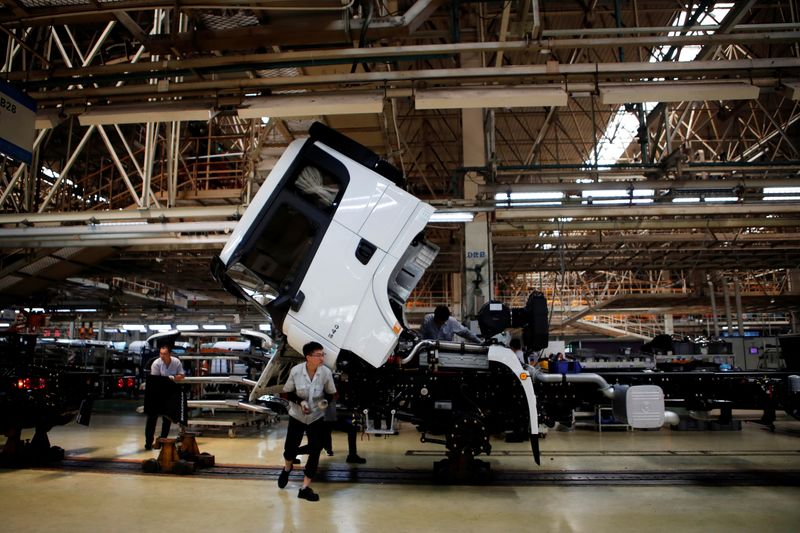Select Language

BEIJING (Reuters) -China's factory output and retail sales beat expectations in the January-February period, marking a solid start for 2024 and offering some relief to policymakers even as weakness in the property sector remains a drag on the economy and confidence.
Industrial output rose 7.0% in the first two months of the year, data released by the National Bureau of Statistics (NBS) showed on Monday, above expectations for a 5.0% increase in a Reuters poll of analysts and faster than the 6.8% growth seen in December. It also marked the quickest growth in almost two years.
Retail sales, a gauge of consumption, rose 5.5%, slowing from a 7.4% increase in December. Analysts had expected retail sales to grow 5.2%.
The eight-day Lunar New Year holiday in February saw a solid return of travel, which supported revenue of tourism and hospitality sectors.
"China’s activity data broadly stabilised at the start of the year. But there are still reasons to think some of the strength could be one-off," Louise Loo, China economist at Oxford Economics.
"Consumers were buoyed temporarily by festivities-related spending at this start of the year. In the absence of decisive consumption-related stimulus this year, we think it would be difficult to sustain a robust consumer spending pace this year."
Fixed asset investment expanded 4.2% in the first two months of 2024 from the same period a year earlier, versus expectations for a 3.2% rise. It grew 3.0% in the whole of 2023.
Notably, private investment grew 0.4% in the first two months, reversing the decline of 0.4% in the whole year of 2023.
Together with better-than-expected trade data and consumer inflation, Monday's indicators will provide some temporary encouragement for policymakers as they try to shore up growth in the world's second-largest economy to keep it on track for an expansion of around 5% this year.
PROPERTY PAINS
But analysts say achieving such growth would be more challenging than last year, which had a lower base effect due to COVID curbs in 2022. Moreover, the property sector remains weak and could continue to be a major impediment to a solid recovery this year.
Zhiwei Zhang, chief economist at Pinpoint Asset Management, said the economic outlook in the second quarter remains uncertain, noting that property sales "plummeted" while the unemployment rate rose.
Property investment slid 9.0% year-on-year in January-February, compared with a 24.0% fall in December but still far from levels of reaching stability.
The frailty of the sector was highlighted by the poor sales. Property sales by floor area logged a 20.5% slide in January-February from a year earlier, compared with a 23.0% fall in December last year.
The job market worsened with the nationwide survey-based jobless rate at 5.3% in January-February, up from 5.1% in December.
The NBS publishes combined January and February industrial output and retail sales data to smooth out distortions caused by the shifting timing of the Lunar New Year. Activity picked up in the first two months of 2023 as COVID curbs were lifted, which may create a less flattering base effect for this year's data.
Premier Li Qiang promised at the annual parliamentary meeting earlier this month to transform the country's growth model and defuse risks in the property sector and local government debt.
China plans to issue 1 trillion yuan in special ultra-long term treasury bonds to support some key sectors and set a higher quota for local government special bond issuance this year.
The country's central bank governor Pan Gongsheng also said at a press conference on March 6 that there was still room to cut banks' reserve ratio requirement (RRR), following a 50-basis points cut announced in January, which was the biggest in two years.
Global monetary easing expectations may also offer some relief for China's hopes of strengthening its vast manufacturing sector although economic conditions in many key developed nations look gloomy over the near term. Britain slipped into a recession in the second half of last year, while Japan and the euro zone have shown meager growth.
Policymakers have pledged to roll out further measures to help stabilise growth after the steps implemented since June had only a modest effect, but analysts caution Beijing's fiscal capacity is now very limited and note Li's address to the annual parliamentary meeting failed to inspire investor confidence.
Many economists say there is a risk that China may begin flirting with Japan-style stagnation later this decade unless authorities take steps to reorient the economy towards household consumption and market-allocation of resources.

